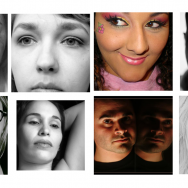People form instant and powerful impressions of each other based on facial features, and computers are increasingly analyzing facial images for various applications. In an interdisciplinary discussion hosted by Chicago Booth Review, University of Chicago scholars Wilma A. Bainbridge, Alexander Todorov and Ben Zhao discuss biases relating to faces and the implications of facial recognition technology.
Part of “The Big Question” video series, the discussion was moderated by Hal Weitzman, an adjunct associate professor of behavioral science at Chicago Booth.
“First impressions are shaped by deep biases that lead us to associate faces with traits such as competence and trustworthiness,” said Weitzman, editor in chief of Chicago Booth Review. “At the same time, the use of facial recognition technology is becoming more widespread, prompting concerns over privacy.”
A cognitive neuroscientist, Bainbridge is an assistant professor in the Department of Psychology whose research focuses in part on what makes some images more memorable than others. A professor at the Booth School of Business, Todorov studies how people perceive, evaluate and make sense of the social world—using methods that range from behavioral experiments to building of computational models. Zhao, a professor in the Department of Computer Science, researches security and privacy problems in machine learning and mobile systems.
Visit the Chicago Booth Review website for a full transcript of their conversation.

